-
The Water Defenders: How Ordinary People Saved a Country from Corporate Greed: A Conversation with Co-authors Robin Broad and John Cavanagh
›
“Many people have watched fights between communities and big corporations around the world. The corporations usually win so those are the Goliath. The Davids usually lose,” says John Cavanagh, co-author of The Water Defenders: How Ordinary People Saved a Country from Corporate Greed. In this week’s episode of Friday Podcasts, Cavanagh and co-author Robin Broad recount how local activists mobilized a global coalition of religious leaders, labor unions, and environmental activists to block an international corporation from opening a gold mine that threatened El Salvador’s fragile water supply.
-
Engaging Marginalized Groups is Essential to Achieving Universal Health Coverage
› Too often, many in my community are excluded from sexual and reproductive health services, said Ruth Morgan Thomas, co-founder and Global Coordinator of the Global Network of Sex Work Projects, in today’s episode of Friday Podcasts. This episode features highlights from a recent Wilson Center and UNFPA event where Thomas and Zandile Simelane, an HIV Youth Advocate from Eswatini, address the barriers that their respective communities—sex workers and HIV positive youth—face in accessing sexual and reproductive health (SRH) services and universal health coverage (UHC).
Too often, many in my community are excluded from sexual and reproductive health services, said Ruth Morgan Thomas, co-founder and Global Coordinator of the Global Network of Sex Work Projects, in today’s episode of Friday Podcasts. This episode features highlights from a recent Wilson Center and UNFPA event where Thomas and Zandile Simelane, an HIV Youth Advocate from Eswatini, address the barriers that their respective communities—sex workers and HIV positive youth—face in accessing sexual and reproductive health (SRH) services and universal health coverage (UHC). -
John Scanlon on the Case for Criminalizing Wildlife Trafficking under International Law
› “The world is still feeling the full brunt of the COVID-19 pandemic which most likely had its origins in a wild animal,” says John Scanlon AO, Former Secretary-General of CITES (the Convention on International Trade in Endangered Species of Wild Fauna and Flora) and Chair of the Global Initiative to End Wildlife Crime, in this week’s Friday Podcast. Scanlon spoke at a recent Wilson Center event on the connections between wildlife crime, human health, and security.
“The world is still feeling the full brunt of the COVID-19 pandemic which most likely had its origins in a wild animal,” says John Scanlon AO, Former Secretary-General of CITES (the Convention on International Trade in Endangered Species of Wild Fauna and Flora) and Chair of the Global Initiative to End Wildlife Crime, in this week’s Friday Podcast. Scanlon spoke at a recent Wilson Center event on the connections between wildlife crime, human health, and security.
-
The Cost of Care: How the COVID-19 Pandemic Has Exacerbated the Baby Bust
› The decision to have a child usually requires a feeling of stability and confidence in the future, says Natascha Braumann, Director of Global Government and Public Affairs for Fertility at EMD Serono, on this week’s episode of Friday Podcasts. But with COVID-19, especially in the first months of the pandemic, there was no feeling of stability. “No one knew what was going to happen.”
The decision to have a child usually requires a feeling of stability and confidence in the future, says Natascha Braumann, Director of Global Government and Public Affairs for Fertility at EMD Serono, on this week’s episode of Friday Podcasts. But with COVID-19, especially in the first months of the pandemic, there was no feeling of stability. “No one knew what was going to happen.” -
A Conversation with Dr. Nahid Toubia: Bodily Autonomy and the 2021 State of World Population Report
›Africa in Transition // Dot-Mom // Friday Podcasts // May 28, 2021 // By Hannah Chosid & Deekshita Ramanarayanan Bodily autonomy is something almost innate in us, and yet also a Eureka moment for many people, says Dr. Nahid Toubia, Director for the Institute of Reproductive Health and Rights in Sudan on this week’s episode of Friday Podcasts. “Every human being really has the right to own their body, to own their decisions, to own their choices regarding their life, their futures, how they want to live, who they want to partner, whether they want to have children or not, what kind of families they want to have,” she says. “So, all of these choices are all wrapped up in this concept of body autonomy.”
Bodily autonomy is something almost innate in us, and yet also a Eureka moment for many people, says Dr. Nahid Toubia, Director for the Institute of Reproductive Health and Rights in Sudan on this week’s episode of Friday Podcasts. “Every human being really has the right to own their body, to own their decisions, to own their choices regarding their life, their futures, how they want to live, who they want to partner, whether they want to have children or not, what kind of families they want to have,” she says. “So, all of these choices are all wrapped up in this concept of body autonomy.” -
Sue Biniaz on Getting the U.S. Back on Track for Climate Action
› “The more the United States can get itself back on track, the better position it is in to exercise climate leadership,” says Sue Biniaz, a member of Special Presidential Envoy for Climate John Kerry’s team, in today’s Friday Podcast. Biniaz spoke about the Biden administration’s efforts to center climate change in U.S. foreign policy and national security at a recent Wilson Center event on climate security risks in the Arctic.
“The more the United States can get itself back on track, the better position it is in to exercise climate leadership,” says Sue Biniaz, a member of Special Presidential Envoy for Climate John Kerry’s team, in today’s Friday Podcast. Biniaz spoke about the Biden administration’s efforts to center climate change in U.S. foreign policy and national security at a recent Wilson Center event on climate security risks in the Arctic. -
A Conversation with Marisa O. Ensor on Securitizing Youth and Youth’s Role in Peace and Security Agendas
› “I’ve been quite impressed by the wide diversity and complexity of young women’s and men’s engagement for peacebuilding and development often while confronting seemingly insurmountable challenges,” says Marisa O. Ensor, Adjunct Professor in the Justice and Peace Studies Program at Georgetown University, in this week’s Friday Podcast.
“I’ve been quite impressed by the wide diversity and complexity of young women’s and men’s engagement for peacebuilding and development often while confronting seemingly insurmountable challenges,” says Marisa O. Ensor, Adjunct Professor in the Justice and Peace Studies Program at Georgetown University, in this week’s Friday Podcast. -
Reviving Culture Through First Nations Midwifery
› “It’s more than just clinical care. It’s cultural. It’s connection to country. It’s connection to land. It’s all of those things that are important to the woman and family, kinship, babies,” says Mel Briggs, a First Nations midwife in Australia, speaking about the importance of Aboriginal midwifery in this week’s Friday Podcast. Like her great-grandmother, Briggs followed the call to midwifery and finds joy in helping women and families “create really healthy, chunky, fat babies.”
“It’s more than just clinical care. It’s cultural. It’s connection to country. It’s connection to land. It’s all of those things that are important to the woman and family, kinship, babies,” says Mel Briggs, a First Nations midwife in Australia, speaking about the importance of Aboriginal midwifery in this week’s Friday Podcast. Like her great-grandmother, Briggs followed the call to midwifery and finds joy in helping women and families “create really healthy, chunky, fat babies.”
Showing posts from category New Security Broadcast.


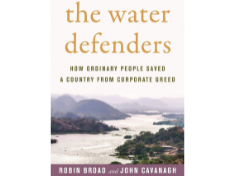
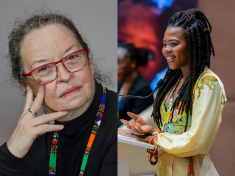 Too often, many in my community are excluded from sexual and reproductive health services, said Ruth Morgan Thomas, co-founder and Global Coordinator of the
Too often, many in my community are excluded from sexual and reproductive health services, said Ruth Morgan Thomas, co-founder and Global Coordinator of the 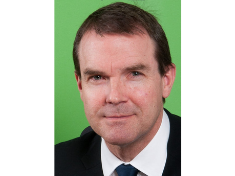 “The world is still feeling the full brunt of the COVID-19 pandemic which most likely had its origins in a wild animal,” says John Scanlon AO, Former Secretary-General of CITES (the Convention on International Trade in Endangered Species of Wild Fauna and Flora) and Chair of the Global Initiative to End Wildlife Crime, in this week’s Friday Podcast. Scanlon spoke at a recent Wilson Center event on the connections between
“The world is still feeling the full brunt of the COVID-19 pandemic which most likely had its origins in a wild animal,” says John Scanlon AO, Former Secretary-General of CITES (the Convention on International Trade in Endangered Species of Wild Fauna and Flora) and Chair of the Global Initiative to End Wildlife Crime, in this week’s Friday Podcast. Scanlon spoke at a recent Wilson Center event on the connections between 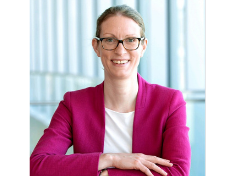 The decision to have a child usually requires a feeling of stability and confidence in the future, says Natascha Braumann, Director of Global Government and Public Affairs for Fertility at EMD Serono, on this week’s episode of Friday Podcasts. But with COVID-19, especially in the first months of the pandemic, there was no feeling of stability. “No one knew what was going to happen.”
The decision to have a child usually requires a feeling of stability and confidence in the future, says Natascha Braumann, Director of Global Government and Public Affairs for Fertility at EMD Serono, on this week’s episode of Friday Podcasts. But with COVID-19, especially in the first months of the pandemic, there was no feeling of stability. “No one knew what was going to happen.”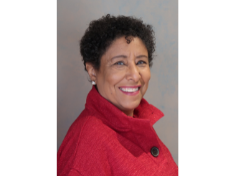
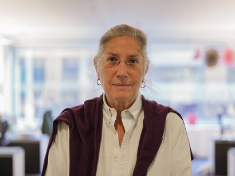 “The more the United States can get itself back on track, the better position it is in to exercise climate leadership,” says Sue Biniaz, a member of Special Presidential Envoy for Climate John Kerry’s team, in today’s Friday Podcast. Biniaz spoke about the Biden administration’s efforts to center climate change in U.S. foreign policy and national security at a recent
“The more the United States can get itself back on track, the better position it is in to exercise climate leadership,” says Sue Biniaz, a member of Special Presidential Envoy for Climate John Kerry’s team, in today’s Friday Podcast. Biniaz spoke about the Biden administration’s efforts to center climate change in U.S. foreign policy and national security at a recent 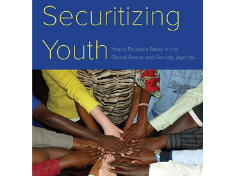 “I’ve been quite impressed by the wide diversity and complexity of young women’s and men’s engagement for peacebuilding and development often while confronting seemingly insurmountable challenges,” says Marisa O. Ensor, Adjunct Professor in the Justice and Peace Studies Program at Georgetown University, in this week’s Friday Podcast.
“I’ve been quite impressed by the wide diversity and complexity of young women’s and men’s engagement for peacebuilding and development often while confronting seemingly insurmountable challenges,” says Marisa O. Ensor, Adjunct Professor in the Justice and Peace Studies Program at Georgetown University, in this week’s Friday Podcast.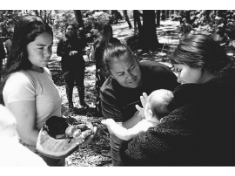 “It’s more than just clinical care. It’s cultural. It’s connection to country. It’s connection to land. It’s all of those things that are important to the woman and family, kinship, babies,” says Mel Briggs, a First Nations midwife in Australia, speaking about
“It’s more than just clinical care. It’s cultural. It’s connection to country. It’s connection to land. It’s all of those things that are important to the woman and family, kinship, babies,” says Mel Briggs, a First Nations midwife in Australia, speaking about 

